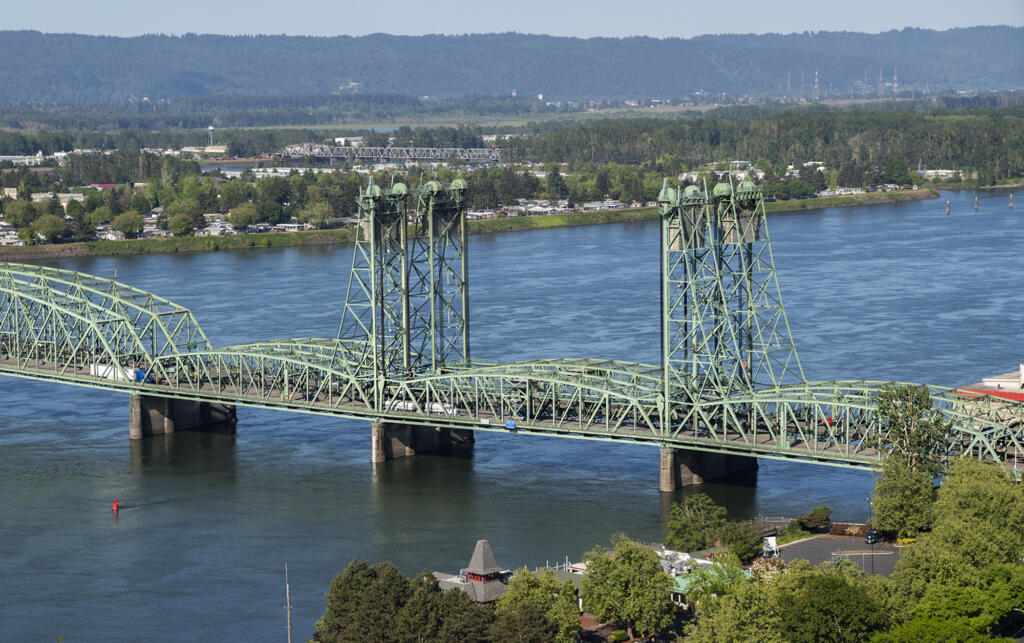The $1 trillion infrastructure bill passed by the Senate on Tuesday would funnel billions of dollars of federal cash to Washington.
The money would be spent on projects ranging from roads, rail lines and airport improvements, to upgrades to the transmission grid to handle the demands of a power industry shifting to cleaner sources of energy.
Both of Washington’s Democratic senators — Maria Cantwell and Patty Murray — are committee chairs, and helped craft the package. The funding includes some high priority Northwest items, including salmon restoration, forest thinning, prescribed burns and monitoring and cleaning up the toxic legacy of firefighting chemicals that have contaminated drinking water.
Washington and Oregon, through a new fund, also could seek money to help replace the Interstate 5 bridge spanning the Columbia River.
“I would put the state of Washington high on a list of states that desperately needs infrastructure investment,” said Cantwell, who chairs the Senate Committee on Commerce, Science and Transportation, in remarks Tuesday on the Senate floor.
“We have been blessed with a growing economy and a big trade economy based on the Pacific Rim … We need to keep moving product. We need to keep moving services and we need infrastructure investment to do so,” Cantwell said.
The legislation includes two measures sponsored by Murray, a Clean School Bus Act that would provide federal grants to help shift the nation’s school bus fleet from diesel to electric, and a $2.75 billion provision to provide grants to state and local communities to improve internet access.
“This bill represents a historic, generational investment in our infrastructure — it will be the single largest investment in bridge repair since we built the interstate highway systems and the largest investment in public transit and clean-energy transmission in history,” said Murray, who chairs the Senate Committee on Health, Education, Labor and Pensions.
The bill’s fate depends on Democratic support in the House. Another Washington legislator, Rep. Pramila Jayapal, D-Seattle, is chair of the Congressional Progressive Caucus, a group of 96 House and Senate members, most of which have indicated they will not vote for the bill unless the Senate approves an even larger $3.5 trillion spending bill. That bill includes spending to combat climate change and poverty and is proposed through a budget reconciliation process, which can be passed by a simple majority of senators without the threat of a Republican filibuster.
“Our caucus is clear: the bipartisan bill will only be passed if a package of social, human and climate infrastructure — reflecting long-standing Democratic priorities — is passed simultaneously through the budget reconciliation process,” Jayapal said in a statement Tuesday.
Sound Transit could see increased federal funding due to a boost in a major grants program that already helps to finance route expansions. The legislation could give a boost to the Lynnwood and Federal Way light-rail projects that are expected to open in 2024, according to Murray’s staff. Those two lines were already awarded $2 billion in federal money toward the total cost of $6.4 billion.
Seattle could apply for federal funds to help with repairs to aging bridges.
The federal allocation of the funds to state projects would be based, in part, on formulas. Under these spending guidelines, Cantwell’s staff says money Washington would be projected to receive includes:
- $384.7 million for grants to airports, including $228 million to Seattle-Tacoma International, $32 million to Spokane International, $16.7 million to Tri-Cities and $16 million to Paine Field in Snohomish County.
- $4.7 billion for highways and $605 million for bridge replacement and repairs
- $380 million for Sound Transit, with the opportunity to apply for additional grants
- $71 million to improve the Washington electric vehicle charging network
Washington also would tap into funds for salmon recovery. They include:
- $1 billion federal fund to replace or remove culverts (authored by Cantwell). Washington would get a portion to assist the state with the task of improving salmon passage as required by a court decision.
- $400 million federal fund for community-based restoration programs that include the removal of fish passage barriers. Washington also would likely receive a portion of this money.
The bill also has provisions intended specifically for the Pacific Northwest. These measures include:
- $10 billion to increase the borrowing authority of the Bonneville Power Administration, the federal wholesaler of hydroelectric power, to assist in financing, construction, acquisition and replacement of parts of the federal Columbia River power system.
- $100 million to create a new program to improve water storage at the John Keys Pumping Station at the base of the Grand Coulee Dam.
- Measures backed by Cantwell to push for modernization of the Columbia River Treaty, which addresses hydropower operations and flood management in the vast drainage that spans the U.S. and Canada. It is now being renegotiated.
- $89 million in grants to the Environmental Protection Agency to assist in restoring Puget Sound.



